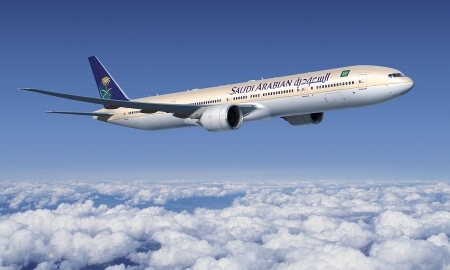Saudi Arabia has witnessed remarkable social and political reforms, and carried out massive projects in the economic, health, education and industrial sectors. It has now become the largest economy in the Middle East and a member of G20. And the national flag carrier
Saudi Arabian Airlines (Saudia) has played a significant role in the kingdom’s social, educational, economic, commercial and industrial development.
To meet its present and future requirements, the company has given top priority to employee training, as it believes that well-qualified and well-trained manpower is the backbone of any organization. The Prince Sultan Aviation Academy in Jeddah has been influential in training the staff of Saudia and other airlines. In addition, Saudia has sent some of its staff members to reputable international universities and colleges abroad on scholarships to pursue higher studies in aviation sciences and technology.
The company’s focus on nurturing human capital backs Custodian of the Two Holy Mosques King Abdullah’s aim to make Saudi Arabia a knowledge-based economy. Since his ascension to the throne in 2005, King Abdullah has adopted a number of measures to realize this goal, including opening new government universities in all regions of the kingdom and licensing several private universities and colleges.
The pilgrims’ choice
Saudia plays a key role in transporting millions of pilgrims who come to the kingdom for Hajj and Umrah (the greater and lesser pilgrimages) every year. It annually transports more than 3 million Umrah pilgrims and about 1 million Hajj pilgrims.
The airline makes advance preparations for the massive pilgrimage operations and deploys additional staff for ground services. It holds meetings with the various government departments at airports to ensure smooth handling of pilgrims and Hajj flights.
Customer Care Centers at airports have been instructed to take care of the pilgrims and their requirements with urgency.
The company states that it considers the services it provides pilgrims “as a great national and religious responsibility, and mobilizes all its resources to render this service in the best possible manner, living up to the expectations of the Saudi government as well as pilgrims.”
Major projects
The tremendous progress achieved by the kingdom’s aviation sector will have a big impact on Saudia’s services. The General Authority of Civil Aviation (GACA) has embarked on a number of massive projects, including the expansion of King Abdulaziz International Airport in Jeddah and Prince Muhammad bin Abdulaziz International Airport in Madinah – two main gateways of growing numbers of foreign pilgrims.
The expansion of King Khalid International Airport in Riyadh is another major project being carried out by GACA. A number of regional airports in Tabuk, Hail, Qassim, Abha, and Yanbu have been developed recently and have started receiving international flights.
| Saudia has made unprecedented progress during the past seven years and its modernization has included purchasing the most advanced, environmentally friendly aircraft |
Easing pressure
A lot of new and attractive plans are in the pipeline to attract passengers and tourists. More than 54 million passengers passed through the kingdom’s 27 airports in 2011, 13.6% more than the figure of 2010. The number of passengers transported by Saudia is growing year after year. In 2012, it carried more than 23.7 million passengers.
At present the air traffic in the kingdom is focused on four airports: King Abdulaziz International Airport in Jeddah, King Khalid International Airport in Riyadh, King Fahd International Airport in Dammam, and Prince Muhammad bin Abdulaziz International Airport in Madinah. GACA intends to reduce pressure on these facilities by expanding nearby airports. The expansion of Madinah airport, which now receives a large number of foreign Hajj flights, has reduced the pressure on Jeddah’s airport. Taif Airport, which is located close to Makkah, is currently undergoing expansion to increase its capacity from 350,000 to 550,000. It has also started receiving Hajj flights and other international flights.
New airports at mega economic cities will also boost the kingdom’s aviation sector, as well as Saudi Arabia having adopted an open-skies policy.
Regional hubs
GACA offers a lot of incentives to attract foreign airlines. Its airport expansion projects are designed to turn King Abdulaziz International Airport, King Khalid International Airport and King Fahd International Airport into major regional hubs.
The Saudi government is encouraging private investment in aviation projects. GACA has signed contracts with private companies to implement a number of airport expansion projects in recent years.
It has also signed contracts with specialized international firms for the operation and maintenance of major airports in the country. The authority intends to privatize domestic and international airports gradually to ensure its commercial and efficient operation, reducing spending. GACA has recently licensed Qatar Airways and Gulf Air to operate domestic flights.
Committed to being the best
Saudia has made unprecedented progress during the past seven years as a result of the combined efforts of its management and staff. The company is also deeply concerned with global warming and other environmental issues. It has been trying its best to protect the environment by purchasing the most advanced and environmentally friendly aircraft to reduce carbon emission.
Despite all its great achievements over the past years, Saudia management believes that this is no time to rest and merely be satisfied with what has been gained. The airline sees big challenges as well as a lot of opportunities around it, and the management is committed to make Saudia one of the best airlines in the world, meeting the requirements of Saudi Arabia and its passengers worldwide.

0 COMMENTS